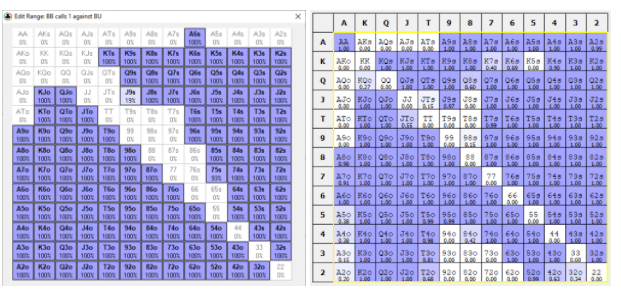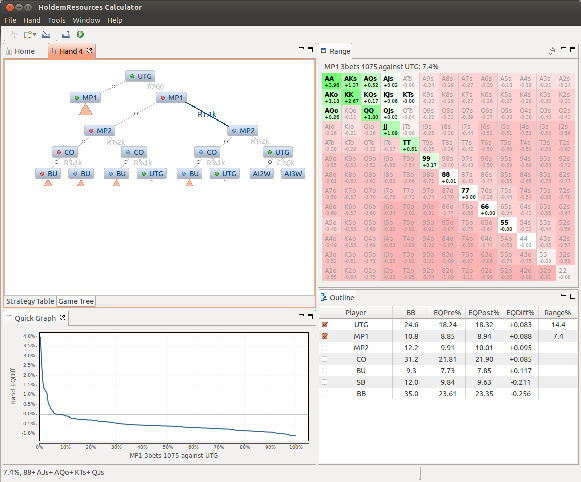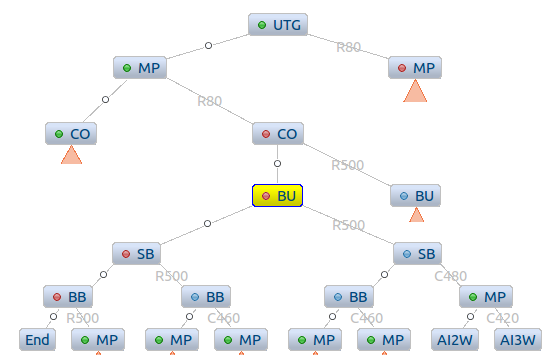Holdem Resources
Click here to jump down the page to view all software in this category.
HoldemResources Calculator is a post-game analytical program designed for Texas Hold'em Tournaments and sit and gos. Whether you are an expert on push/fold situations and ICM or just starting out, this calculator will help you take your game to the next level through understanding of the math behind Texas Hold'em situations. The ranges were built using the advanced poker simulation programs PioSolver, Monker Solver, Holdem Resources Calculator, and Poker Snowie. These ranges are guaranteed to help you go deeper and win more money. All ranges are stored on phone so once you download the app you are good to go, no internet connection needed to use the app.
Poker simulation software is software that allows you to simulate a number of different related poker things. Ranging from actual poker games to individual hands, this software allows you to experience playing poker and analyzing poker hands without risking any money at the tables. By using online poker simulation software you can improve your poker game and learn more about the odds and statistics involved in the game.
Simulation programs allow you to analyze poker hands in great detail. The two most widely used poker calculator and simulation programs are PokerStove and the more complex Pokerazor. These programs allow you to set up poker hands with a variety of options such as choosing hand ranges and flop types and they calculate different probabilities and hand equities by simulating thousands of hands of poker in a very short amount of time. Such detailed information is useful when analyzing poker hands and figuring out what kinds of hands you should be going all in with against different opponents.
A number of Sit-n-go tools also fall into the simulation software category. The primary use of these SNG simulation programs is to present situations to the user so that the user can analyze the situation and choose an action to make. The software then gives the correct answer to the user along with an explanation as to why that action is correct. This repetition and training allows poker players to develop an almost subconscious ability to analyze situations and make rapid and correct decisions. SNG Wizard and SNG End Game Tools (or SNGEGT for short) are two excellent programs that can be used to take your game to the next level.
DD Poker is an excellent tool to help the novice player improve
3.83 out of 5
Full featured hand history replayer and review tool
3.57 out of 5
No Video Available
Review of poker software applications for the Apple iPhone
3.54 out of 5
No Video Available
An awesome sit and go training tool
3.30 out of 5
Master flop textures and hand ranges with Flopzilla. The program will allow you to sharpen your range-assigning skills so that they become second nature.
3.30 out of 5
Realistic poker training against AI poker bots
3.00 out of 5
Software that allows you to share your desktop with others
2.00 out of 5
Another entry into the ICM market.


1.40 out of 5

No Video Available
Review of Ace Poker Drills, which consists of an Equity Trainer, Pre-Flop Trainer, and an Odd/Outs and Equity Calculator.
Not Rated Yet

Table Of Contents
Gareth James is a tournament poker player, author, coach, content creator and streamer.
He currently grinds the off-peak Sunday schedule over on Twitch and you can find his regular strategy content, for free, over on Youtube.
I'll start this article off by saying I love Holdem Resources Calculator (HRC). I've used it for many years and regularly recommend it to my students.
However, recently I've seen some content from well-known, respected poker players, authors and streamers who seem to be suggesting that it can give you good opening ranges and responses to those ranges including good, solid BB defence strategies and I'm a bit concerned.
Mainly because I know that HRC cannot do these things as it doesn't factor in equity realisation.
HRC is great and I use it regularly, but definitely not for working out opening ranges or response ranges.
In this article I'm going to just focus on BB defence at 20bb and compare the results of both Holdem Resources Calculator and Simple Preflop Holdem.
READ MORE:7 Tips to Take Your Poker Game From 'Meh' to Amazing
What is Equity Realisation?
First let's talk about equity realisation, what it is and how we know HRC doesn't use it.
Equity realisation is how much of the pot a hand can expect to make (as a percentage) based on raw equity AND many other postflop variables including, but not limited to:
- Whether you're in or out of position
- The type of hand you have (a suited hand like 76s will realise equity better than K2o for example)
- The skill level of your opponent (e.g. will they find enough aggressive moves that will prevent you from seeing turn and river cards?)

The key thing here is the fact that it relies on postflop variables.
Now even if we take out the skill level of your opponent, it will hopefully be clear already that in order for a solver to solve properly, it will need to factor in these postflop variables.
Sadly, HRC does not. It essentially believes that after the final preflop action where neither player is all in (so there is an opportunity for postflop betting to take place) the hand just gets checked to showdown, something which rarely happens or at least is rarely strategically optimal.
Putting Theory into Practice
Let me give you an example. Nine players at the table, everyone has 20bb, the blinds are 0.5bb/1bb with an ante of 0.13bb and it folds around to the BTN who opens for a minraise.
For this example, I've run an advanced hand where I've edited the range for the BTN to see what Holdem Resources Calculator suggests the BB can call and 3-bet jam versus this open.
This is the result:
As you can see it's suggesting playing 100% of hands: calling 81.8% and 3-bet jamming 18.2%. Now you could be the best player in the world postflop, but I still don't think you're going to be able to play 72o well enough where it's actually going to make money as a call.
So what's going on here?
When the BTN opens for a minraise there are 4.67BBs in the middle and it costs the BB just 1BB to call. Thus, they're getting 4.67:1 odds which is about 17.6%.
As you can see, every single hand has enough equity to make the call here, which is why HRC is suggesting playing 100% of hands.
72o, though, does a really poor job at realising equity. In order to profitably call, you would have to realise more than 60% of your equity with 72o, something that just isn't going to happen.
READ MORE:What Is Real-Time Assistance (RTA)? Is it Legal?
Button vs Big Blind
To better illustrate this point, here's a table of selected hands for this spot 20bb BTN vs BB to look at how different hands do at realising equity, sorted by those that realise the best. For a hand to be a profitable call the equity x equity realization has to be higher than 17.6%.
Now all of the hands in this table will make the grade, simply because I only included profitable hands in the BB defence range when running the reports in Piosolver in the first place.
The key thing to focus on here is how some hands do better than others at realising equity. Suited hands will always do better than their offsuit counterparts.
Connected hands will always do better than unconnected hands. K4o, while having a lot more raw equity than 32s, does a lot worse in terms of equity realisation.
| Hand | Equity (%) | Equity Realization (%) |
|---|---|---|
| A9s | 57.27 | 113.44 |
| KJs | 53.98 | 102.79 |
| QJs | 49.68 | 101.12 |
| J9s | 43.21 | 94.6 |
| 76s | 39.19 | 91.13 |
| A8o | 53.38 | 90.87 |
| 32s | 34.45 | 90.71 |
| KJo | 51.49 | 87 |
| T2s | 35.08 | 83.08 |
| 98o | 36.18 | 80.36 |
| QTo | 45.54 | 79.94 |
| T8o | 36.79 | 74.87 |
| K8o | 44.79 | 67 |
| Q6o | 39.26 | 60.88 |
| J3o | 33.55 | 59.43 |
| K4o | 40.19 | 56.94 |
| Q5o | 38.11 | 56.44 |
Simple Preflop Holdem
So if HRC doesn't give us a usable solution, how do we solve this problem?
Enter... Simple Preflop Holdem.
Simple Preflop Holdem is a preflop solver that factors in equity realisation by considering some of the postflop variables we discussed earlier - namely postflop betting and position.
I've used exactly the same opening range for the BTN and once again given the BB the options to 3-bet jam, call or fold. Here's the result from Simple Preflop Holdem this time:
Holdem Resources Icm
Let's take a look at the calling and 3-bet jamming strategies side by side for comparison.
Holdemresources Nash
As you can see there are some big differences, mainly with suited hands. Simple Preflop Holdem does a lot more calling with suited broadways and suited Aces, hands that HRC likes to jam, but then just folds hands like 94o, 93o and 73o, which HRC likes as a call.
Holdem Resources Calculator Vs Icmizer
Again there are some differences here. Simple Preflop Holdem likes to jam the weaker offsuit Ax hands more frequently, but then flats hands like AA, QTs and T7s that HRC likes to jam.
What Simple Preflop Holdem is essentially doing here is telling us that it believes it's a higher EV play to just call Aces than it is to jam and the same goes for other hands like KQs, A5s and T7s.
You can clearly see equity realisation being utilised here to give a better strategy where the EV of both lines are compared and the better one is recommended.
In Conclusion
HRC is good for many things, especially push/fold in cEV and $EV situations at 8bb and under, but it can't give you solid BB defence strategies that you can use in your own game so please don't use it for that.
When we think about which hands to flat and which hands to 3-bet jam, we should always be thinking about which line will generate the higher EV.
We also need to make sure we're making +EV decisions in the first place and not blindly following the HRC readout and calling with 72o and 94o.
Holdemresources Nash
Are you a Game Changer or just a player? Boost your ROI with just a few hours a month without breaking the bank by joining MTT Game Changer, a group coaching program for low to midstakes players and bankrolls by clicking here.